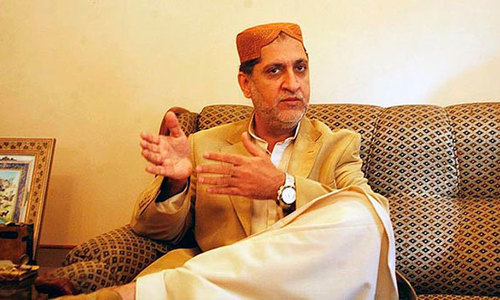ISLAMABAD: Balochistan National Party (BNP) chief Sardar Akhtar Jan Mengal on Friday criticised the election results and said it was for the first time that the results were given to the candidates or their polling agents on a piece of paper instead of the official forms.
The former chief minister of Balochistan said the caretaker government and the Election Commission of Pakistan (ECP) should be given awards for holding such an election.
“We are given a controlled democracy; why is it so?” he said at a meet-the-press programme at National Press Club.
Mr Mengal said the country witnesses a new experiment after every two or five years but issues faced by his province were political and economic and that operations cannot resolve them.
He said the involvement of the establishment should be stopped so that a change in the situation in Balochistan could be seen.
The whole nation is being deceived in the name of CPEC and Gwadar Port, he said, adding there were three major issues in his province: the recovery of missing persons, justified distribution of national wealth along with powers and addressing the concerns related to CPEC and Gwadar Port.
He said not only the establishment but even political powers were responsible for the sorry state of affairs in the province.
“There had been free and fair elections in 1970 but its results were not accepted by the authorities. The 2018 elections were based on pre-poll rigging, and the wishes of the people were discarded.”
He said had the results of the 1970 elections been accepted the country would not be in the current ‘pathetic’ state. He slammed the whole election process and said the results were rigged.
The BNP chief said nobody cared about the problems faced by the people of Balochistan.
He said $5 million were being spent on the development of Gwader but the fact was that the residents of the city were facing an acute shortage of water.
He also spoke about his party’s structure and said the BNP consisted of tribes but not groups and everybody, including various clans, was given representation in the party.
Conditions are different in Balochistan and in the rest of the country. Those living Islamabad are well aware of the conditions in the remaining parts of the country except Balochistan.
He said it was unfortunate that people of different provinces shared their feelings only through the social media. The differences among the people were due to the misdirected policies of the establishment.
Apart from the local fallout of these policies, the image of Pakistan is being tarnished the world over due to the lack of trust among the public in the system.
He called upon the political powers to play a role in bridging this gap among the ordinary citizens.
He said almost all political parties had agreed to give rights to the deprived populace of Balochistan but it was never implemented.
Published in Dawn, August 4th, 2018















































